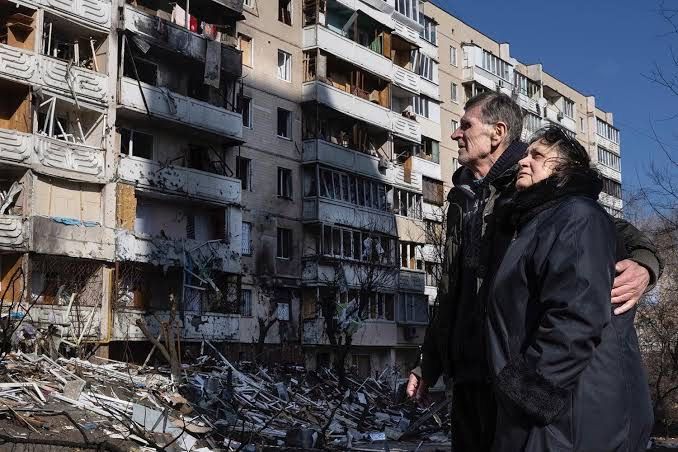After the Storm: Envisioning a Post-War Ukraine
As the war in Ukraine rages on, a grim reality of destruction, loss, and displacement has become the everyday norm for countless Ukrainian citizens. Streets once bustling with life now stand eerily silent, homes once filled with warmth are left in ruins, and communities once vibrant are fragmented. Yet amidst

As the war in Ukraine rages on, a grim reality of destruction, loss, and displacement has become the everyday norm for countless Ukrainian citizens. Streets once bustling with life now stand eerily silent, homes once filled with warmth are left in ruins, and communities once vibrant are fragmented. Yet amidst this harrowing reality, there lies a pressing need to envisage what a post-war Ukraine might look like.
A key issue is reconciliation. After all the pain, loss, and anger, Ukrainians will need to find a way to reconcile with the past, to foster mutual understanding and forgiveness, and to ensure that the grievances which sparked the war are not carried forward into a new era of peace. This will be a complex process that may take years or even decades, but it is essential to preventing the recurrence of conflict.
The task of reconstruction will also be immense. Physical infrastructure will need to be rebuilt, from damaged homes and schools to destroyed bridges and roads. More importantly, Ukraine will need to reconstruct its social fabric, healing the wounds that the war has inflicted on communities and re-establishing the bonds of trust and mutual reliance that make a society function.
A functional and fair legal system, a cornerstone of any democratic society, will have to be restored or reinvented. The rule of law must be reasserted, and those who committed war crimes held accountable. This is not just about punishment - it's about ensuring that justice is seen to be done and restoring faith in the nation's institutions.
There will also be the challenge of social integration. This will involve reintegrating displaced people and former combatants into society, providing them with the support and opportunities they need to rebuild their lives. It may also involve dealing with refugees who have fled Ukraine and now wish to return.
All of these issues are further complicated by the need for political stabilization. Ukraine will need to rebuild its political institutions, hold free and fair elections, and ensure that its government is representative and responsive to the needs of its people.
All these tasks are undoubtedly daunting. Yet, they are crucial steps in Ukraine's journey towards a stable and peaceful future. While the focus right now is understandably on the war itself, it's crucial to start thinking about what comes next. If Ukraine is to move beyond the war and towards lasting peace, these are the challenges that it will need to confront head-on. A peaceful, resilient Ukraine can emerge from the ashes of war - but only if we start planning for it now.
The Long Road to Recovery: Predicting the Timeline of Ukraine's Post-War Stabilization"
Coming to terms with the aftermath of a war is a long and arduous process, and predicting a precise timeline for stabilization is not straightforward. It depends on a multitude of factors, ranging from the nature and extent of the war's devastation, the availability of resources for reconstruction, the resilience of the people and their leadership, and the external support that the country receives. However, historical precedents suggest that such processes can span decades, not just years.
First and foremost, the process of reconciliation is a deeply personal and subjective experience, and it is also the foundation for healing on a national level. The emotional wounds inflicted by war—loss, trauma, displacement—will take a long time to heal. It can take generations for people to move beyond their personal experiences and collective memories, and to replace them with a narrative of peace and shared future.
Physical reconstruction also takes time, often longer than initially anticipated. Rebuilding infrastructure, from houses to schools, roads to hospitals, is not just about construction. It’s about restoring the sense of community and security that comes with familiar landscapes and functional public services. Even with ample resources, this process could take many years, possibly even decades.
Establishing rule of law and social integration are processes deeply intertwined with both reconciliation and reconstruction. Trust in institutions and the integration of former combatants or displaced people into society cannot happen overnight. These are processes that require patience, tolerance, and concerted efforts on many different levels of society.
In the political realm, establishing stable institutions, ensuring they function effectively and transparently, and rebuilding public trust is a long-term undertaking. Building a democratic culture, particularly in the wake of conflict, requires sustained efforts in education, dialogue, and citizen participation.
Lastly, let us not forget the factor of external influence and global politics, which can significantly affect a nation's path towards stabilization. Support, be it economic, political or humanitarian, from the international community can significantly expedite the post-war recovery process.
In conclusion, while it is impossible to put an exact timeline on these processes, it is clear that healing the wounds of war and moving towards a peaceful, stable future is a long journey. It may take generations, but the collective effort and resilience can turn the daunting task into an achievable reality. Thus, it's critical for Ukraine to start planning for this future now, even while the conflict continues.




